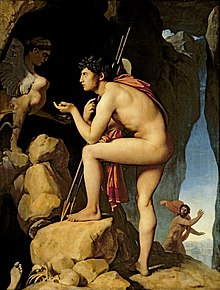
Back عقدة أوديب Arabic عقدة اوديب ARZ ইডিপাছ কমপ্লেক্স Assamese Complexu d'Edipu AST Edip kompleksi Azerbaijani Edipuskomplex BAR Kompleks ni Edipo BCL Едипов комплекс Bulgarian ইডিপাস কমপ্লেক্স Bengali/Bangla Edipov kompleks BS

In classical psychoanalytic theory, the Oedipus complex (also spelled Œdipus complex) refers to a son's sexual attitude towards his mother and concomitant hostility toward his father, first formed during the phallic stage of psychosexual development. A daughter's attitude of desire for her father and hostility toward her mother is referred to as the feminine Oedipus complex.[1] The general concept was considered by Sigmund Freud in The Interpretation of Dreams (1899), although the term itself was introduced in his paper A Special Type of Choice of Object made by Men (1910).[2][3]
Freud's ideas of castration anxiety and penis envy refer to the differences of the sexes in their experience of the Oedipus complex.[4] The complex is thought to persist into adulthood as an unconscious psychic structure which can assist in social adaptation but also be the cause of neurosis. According to sexual difference, a positive Oedipus complex refers to the child's sexual desire for the opposite-sex parent and aversion to the same-sex parent, while a negative Oedipus complex refers to the desire for the same-sex parent and aversion to the opposite-sex parent.[3][5][6] Freud considered that the child's identification with the same-sex parent is the socially acceptable outcome of the complex. Failure to move on from the compulsion to satisfy a basic desire and to reconcile with the same-sex parent leads to neurosis.
The theory is named for the mythological figure Oedipus, an ancient Theban king who discovers he has unknowingly murdered his father and married his mother, whose depiction in Sophocles' Oedipus Rex had a profound influence on Freud. Freud rejected the term Electra complex,[7] introduced by Carl Jung in 1913[8] as a proposed equivalent complex among young girls.[7]
Some critics have argued that Freud, by abandoning his earlier seduction theory (which attributed neurosis to childhood sexual abuse) and replacing it with the theory of the Oedipus complex, instigated a cover-up for sexual abuse of children. Some scholars and psychologists have criticized the theory for being incapable of applying to same-sex parents, and as being incompatible with the widespread aversion to incest.
- ^ "Oedipus complex". APA Dictionary of Psychology. American Psychological Association. Retrieved 4 September 2023.
- ^ Nagera, Humberto, ed. (2012) [1969]. "Oedipus complex (pp. 64ff.)". Basic Psychoanalytic Concepts on the Libido Theory. London: Karnac Books. ISBN 978-1-781-81098-9.
- ^ a b Laplanche, Jean; Pontalis, Jean-Bertrand (1988) [1973]. "Oedipus complex (pp. 282ff.)". The Language of Psycho-analysis (reprint, revised ed.). London: Karnac Books. ISBN 978-0-946-43949-2.
- ^ Freud, Sigmund (1989). Gay, Peter (ed.). The Freud Reader (1st ed.). New York: W.W. Norton. pp. 664–665. ISBN 0393026868. OCLC 19125772.
- ^ Auchincloss, Elizabeth (2015). The Psychoanalytic Model of the Mind. American Psychiatric Publishing. p. 110.
- ^ Auchincloss, Elizabeth (2012). Psychoanalytic Terms and Concepts. American Psychoanalytic Association. p. 180.
- ^ a b Laplanche, Jean; Pontalis, J.B. (1973). The language of psycho-analysis. New York: W.W. Norton. p. 152. ISBN 0393011054. OCLC 741058.
- ^ Jung, C. G. (1915). The Theory of Psychoanalysis. Nervous and mental disease monograph series, no. 19. New York: Nervous and Mental Disease Publishing Co. p. 69.